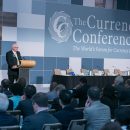21 October, 2009
forward by brendan burge
… cash versus cash-less??
… is the UK leading the way? …
It would seem that the incumbent and clear leader is hard currency!
Ultimately we all know the following to be true  –  hard currency is a part of everyone’s lives… and because we love to use notes and coins, they need to move…
Notes and coins are ultimately all the same, physical items requiring transportation, placement, storage, return (too much!), dispensing (ordering), reconciliation, financing (in most cases), time in the “dead zone” (inactive and unverified), usage (you and I spending a buck!),and ultimate deposit to a depository institution, and so on… all-in a physical management challenge made more complex by the value assigned to the items of inventory….
… it is our great pleasure to replicate (with permission) a special commentary from Ms. Astrid Mitchell, Editor of Currency News
… by the way… you may also find this months Currency News page to contain a very interesting article by John Marsh and Jon Francis of Global Currency Consulting Ltd. …
 The past year or so has been by and large a good one for the currency industry. The economic meltdown has led to increased demand for cash, while the banks and financial institutions, preoccupied with rather more weighty issues than pushing people toward payment instruments that benefit them, have gone quiet on the subject.
The past year or so has been by and large a good one for the currency industry. The economic meltdown has led to increased demand for cash, while the banks and financial institutions, preoccupied with rather more weighty issues than pushing people toward payment instruments that benefit them, have gone quiet on the subject.
But, as we have remarked in earlier issues (of Currency News), they may have gone quiet, but they certainly haven’t gone away. This was clear at the recent ICCOS EMEA conference in Amsterdam, where there was an interesting comparison to be drawn between the remarks made on behalf of the European Payments Council (EPC) on the one hand, and the Dutch Retail Association on the other.
The EPC is a group of European financial institutions set up to help put in place SEPA (the Single European Payments Area), which intends to remove all borders regarding cashless payments. Although SEPA does not relate to cash, the fact that the banks are having to bear the costs of its implementation have made them look closely at the costs of cash, and they don’t like what they see. Hence part of their work via the EPC has been on highlighting what they see as inequalities between cash and cashless payments, with a view to ‘rationalising’ the former. This has been a bone of contention between the cash community and the EPC for some time, but its representative, Gerard Hartsink, was at pains to point out that the so-called ‘War on Cash’ spearheaded by the major card issuers is no more, and that the banks have moved on from this position.
‘Taskforce Cashless’
Fast forward a day, and the last presentation of the conference, from Illya Bruggeman, Payments Advisor for the Dutch Retail Consortium. In this he laid out the retailers’ view of cash – which is that is it is expensive – more so than cashless payments – and, due to robberies, internal fraud and counterfeiting – unsafe. The Dutch retailers and banks have had an agreement since 2005 to promote debit card transactions, have established Taskforce Cashless to promote their case and, recognising that the public still prefer cash, are committed to ‘educating’ them otherwise.
Needless to say one could almost hear the sound of the backbones of the delegates present stiffening in protest.
The view of the Dutch Retail Association is in very sharp contrast to that of the British Retail Consortium, which earlier this year – at ICCOS in the US – reported that cash remains the cheapest form of transaction for retailers and the most popular for them and consumers alike (see CN Vol 7, No 4).
But the Dutch are not alone in this view. There is a similar agenda among banks and retail institutions in Scandinavia in particular, where there have been a variety of eye-catching PR initiatives to teach the public about the dangers of cash (with the recent and audacious attack on a G4S cash centre in Stockholm, where the criminals used a helicopter to access the facility and made off with an unspecified sum, being used to demonstrate the point).
 Ever present in the background, meanwhile, are the powerful forces of the financial industry as a whole, including Mastercard and Visa, who may have quietened down in recent months but who – as economic equilibrium returns and public fury with banks abates – are undoubtedly set to commence battle again.
Ever present in the background, meanwhile, are the powerful forces of the financial industry as a whole, including Mastercard and Visa, who may have quietened down in recent months but who – as economic equilibrium returns and public fury with banks abates – are undoubtedly set to commence battle again.
If these forces can work together collectively to make the case for displacing cash, the cash community needs to do likewise to counter them. In this respect, we return to another perennial theme – which is the need for the cash community to stop internalising issues of competition and to start looking outwards to where the real threat lies.
But who can make this case? And where is this voice?
Carrying the Torch
There is IACA (the International Association of Currency Affairs), but this is aimed at improving communications within the industry and is explicitly a non-political, non-lobbying organisation. There are various affiliations and special interest groups created to promote specific technologies or issues.  But no single voice that encompasses the community as a whole. The nearest there is is ESTA – the European Security Transport Association – which does an excellent job. But it cannot be expected to carry the torch on its own.
 This is particularly true given that the case for cash needs to be made not only to politicians, the financial community and retailers, but to a wider audience – namely the public. There is a mass of empirical evidence that supports the case for cash – whether it is in the staggering cost of payment fraud versus counterfeiting, the real costs of cash versus cashless, or even the value of seigniorage (always a hard one to push!).
This is particularly true given that the case for cash needs to be made not only to politicians, the financial community and retailers, but to a wider audience – namely the public. There is a mass of empirical evidence that supports the case for cash – whether it is in the staggering cost of payment fraud versus counterfeiting, the real costs of cash versus cashless, or even the value of seigniorage (always a hard one to push!).
Getting this across will take resources and commitment from the currency community as a whole. Does the community have the appetite for this? It needs to because if nothing is done to counter them, the efforts of the anti-cash community could in time result in public attitudes changing to the detriment of us all.
… on the more humorous side…










